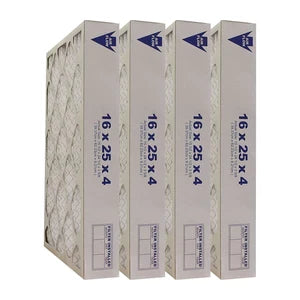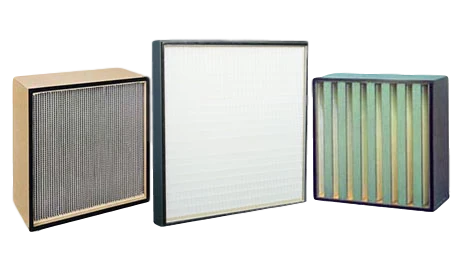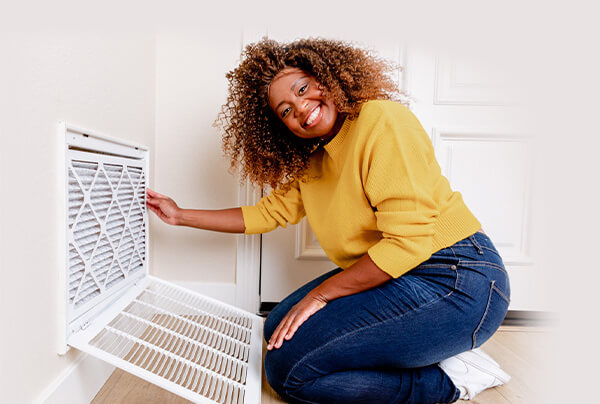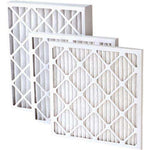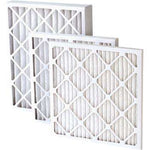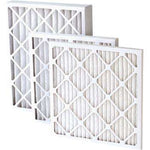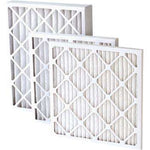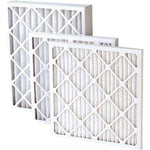You have no items in your shopping cart.
Choosing the right air filter can seem like a complicated process, but it doesn't have to be. It's all about knowing what type of filter you need and how often you should change it. This guide will cover everything from what types of filters are available to how often they should be changed based on your usage.
Why is it important to choose the right filter?
HVAC filters are important for your health and the health of your family. They can help keep your home clean, reduce energy costs, improve air quality and keep your HVAC unit running efficiently.
You'll want to consider these five factors when choosing a filter:
- Filter material
- Filter size (or thickness)
- Maximum airflow rate of the filter
- Media density (thickness) of the media used in manufacturing a particulate air filter
What are the different types of air filters available?
There are several different types of air filters, each with its own benefits and drawbacks. The most common types are:
- Air filter canister (also called an air cleaner). This is a boxy device that attaches to your wall or ceiling and contains pleated filters. It's not ideal for homes with pets because they have a tendency to get clogged easily with pet dander, hair and dust mites.
- Air filter media (also called filter media). This is the part of an HVAC system that removes particles from indoor air through an electrostatic process involving charged plates within the unit itself.
- Air filter housing (also called housing). The assembly that holds all other components together in one package so you can install them quickly without having to take anything apart or put things together piece by piece yourself!
How often will I have to change my filters?
The answer to this question depends on a few factors. First, it's important to note that the more often you use your HVAC system, the more often you'll have to change your filters. If you run it all day long every day during summer and winter months (or even just during one season), then it would be wise for you to get in the habit of changing them every 3-6 months--and maybe even less frequently if possible!
Second, the type of filter plays into how long they last as well. Some types are better at capturing dust than others; some can handle harmful substances like pet dander and pollen better than others; so if this is something that concerns you or if there are other reasons why having a HEPA filter might matter more than others (elderly family members who suffer from allergies), then consider purchasing one specifically designed for those purposes instead.
Thirdly--and this may seem obvious but bear with me--the quality of air inside our homes matters too! If we live in areas where pollution levels are high outside due to factories nearby or heavy traffic near our homes/apartment buildings/townhouses etc., then having filters with higher effectiveness ratings would help us breathe easier inside those environments while also keeping them cleaner overall through proper filtration techniques such as HEPA removal capabilities."
What should I look for when buying an HVAC filter?
In order to find the right filter for your home, you'll need to consider a few things. First, what size is your air conditioner? If you're unsure about how to measure it or if it's not written in the manual, check out this article on how to measure an HVAC unit for filters.
Next, what type of air conditioner do you have? Do they use refrigerant or non-refrigerant models? Most modern residential cooling systems rely on refrigerant as their cooling agent (the substance that absorbs heat from inside air), while older models may use non-refrigerants such as ammonia instead.
Finally: do you want a permanent filter or disposable one? Reusable/washable filters can be pricey but last longer than disposable ones; however, these types might not fit into some tight spaces like those found in older homes with smaller ductwork systems installed before modern standards were introduced into building codes across America during World War II era construction projects meant specifically for military personnel stationed overseas who needed comfortable living conditions despite being far away from home during wartime conditions back here at home (like those who fought in World War II).
Optimizing Your Home's Air Quality: The Effortless Impact of an Air Filter
There are a lot of things you can do to improve the quality of your home's air, but one of the easiest ways is with a furnace filter. Air filters help reduce allergens, bacteria, viruses and other contaminants from circulating in your home. They also help extend the life of your HVAC system by reducing wear on its motor or fan blades.
Air filters are inexpensive and easy to install; they simply slip over the end of an HVAC duct once it reaches its destination in your house (usually near an exterior wall). The most effective type of filter--called an electronic medium-efficiency particulate arrestance (or " MERV" )--uses electrostatic charges on its surface that attract dust particles as they pass through it so they don't make contact with any other surfaces inside your ductwork before being sucked out by fans located at various points throughout each room where these systems operate continuously 24 hours per day 365 days per year!
Conclusion
We hope that you've found this guide helpful in understanding the different types of HVAC filters and what they can do for your home. If you have any questions, please don't hesitate to reach out! We are always happy to help our customers choose the right filter for their needs.
Choosing the right air filter can seem like a complicated process, but it doesn't have to be. It's all about knowing what type of filter you need and how often you should change it. This guide will cover everything from what types of filters are available to how often they should be changed based on your usage.
Why is it important to choose the right filter?
HVAC filters are important for your health and the health of your family. They can help keep your home clean, reduce energy costs, improve air quality and keep your HVAC unit running efficiently.
You'll want to consider these five factors when choosing a filter:
- Filter material
- Filter size (or thickness)
- Maximum airflow rate of the filter
- Media density (thickness) of the media used in manufacturing a particulate air filter
What are the different types of air filters available?
There are several different types of air filters, each with its own benefits and drawbacks. The most common types are:
- Air filter canister (also called an air cleaner). This is a boxy device that attaches to your wall or ceiling and contains pleated filters. It's not ideal for homes with pets because they have a tendency to get clogged easily with pet dander, hair and dust mites.
- Air filter media (also called filter media). This is the part of an HVAC system that removes particles from indoor air through an electrostatic process involving charged plates within the unit itself.
- Air filter housing (also called housing). The assembly that holds all other components together in one package so you can install them quickly without having to take anything apart or put things together piece by piece yourself!
How often will I have to change my filters?
The answer to this question depends on a few factors. First, it's important to note that the more often you use your HVAC system, the more often you'll have to change your filters. If you run it all day long every day during summer and winter months (or even just during one season), then it would be wise for you to get in the habit of changing them every 3-6 months--and maybe even less frequently if possible!
Second, the type of filter plays into how long they last as well. Some types are better at capturing dust than others; some can handle harmful substances like pet dander and pollen better than others; so if this is something that concerns you or if there are other reasons why having a HEPA filter might matter more than others (elderly family members who suffer from allergies), then consider purchasing one specifically designed for those purposes instead.
Thirdly--and this may seem obvious but bear with me--the quality of air inside our homes matters too! If we live in areas where pollution levels are high outside due to factories nearby or heavy traffic near our homes/apartment buildings/townhouses etc., then having filters with higher effectiveness ratings would help us breathe easier inside those environments while also keeping them cleaner overall through proper filtration techniques such as HEPA removal capabilities."
What should I look for when buying an HVAC filter?
In order to find the right filter for your home, you'll need to consider a few things. First, what size is your air conditioner? If you're unsure about how to measure it or if it's not written in the manual, check out this article on how to measure an HVAC unit for filters.
Next, what type of air conditioner do you have? Do they use refrigerant or non-refrigerant models? Most modern residential cooling systems rely on refrigerant as their cooling agent (the substance that absorbs heat from inside air), while older models may use non-refrigerants such as ammonia instead.
Finally: do you want a permanent filter or disposable one? Reusable/washable filters can be pricey but last longer than disposable ones; however, these types might not fit into some tight spaces like those found in older homes with smaller ductwork systems installed before modern standards were introduced into building codes across America during World War II era construction projects meant specifically for military personnel stationed overseas who needed comfortable living conditions despite being far away from home during wartime conditions back here at home (like those who fought in World War II).
Optimizing Your Home's Air Quality: The Effortless Impact of an Air Filter
There are a lot of things you can do to improve the quality of your home's air, but one of the easiest ways is with a furnace filter. Air filters help reduce allergens, bacteria, viruses and other contaminants from circulating in your home. They also help extend the life of your HVAC system by reducing wear on its motor or fan blades.
Air filters are inexpensive and easy to install; they simply slip over the end of an HVAC duct once it reaches its destination in your house (usually near an exterior wall). The most effective type of filter--called an electronic medium-efficiency particulate arrestance (or " MERV" )--uses electrostatic charges on its surface that attract dust particles as they pass through it so they don't make contact with any other surfaces inside your ductwork before being sucked out by fans located at various points throughout each room where these systems operate continuously 24 hours per day 365 days per year!
Conclusion
We hope that you've found this guide helpful in understanding the different types of HVAC filters and what they can do for your home. If you have any questions, please don't hesitate to reach out! We are always happy to help our customers choose the right filter for their needs.
